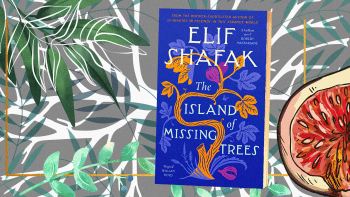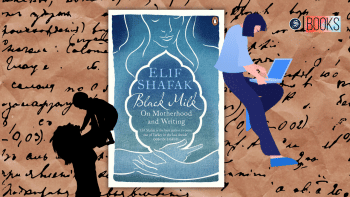A glimpse of the Istanbul we don’t know

There is a difference between being hooked "from" the start of a book and being hooked "by" the start of it. 10 Minutes 38 Seconds in This Strange World—Elif Shafak's 11th novel—does the latter.
"Her name was Leila. Tequila Leila as she was called at home and at work, in that rosewood-coloured house on a cobblestoned cul-de-sac down by the wharf, nestled between a church and a synagogue, among lamp shops and kebab shops—the street that harboured the oldest licensed brothels in Istanbul. Still, if she were to hear you put it like that, she might take offense and playfully hurl a shoe—one of her high-heeled stilettos." In one short opening paragraph, we are thrown smack into the heart of a world, zooming past the frontier separating fact and fiction into a city and a neighbourhood ringing with its smells and sounds, its unique collage of landmarks. "'Is, darling, not was...My name is Tequila Leila.'" In one short sentence, our protagonist has come alive in tone, look, and personality, even as her body decays in a metal rubbish bin.
Several ideas coalesced to inspire Shafak for this novel. Known—and persecuted in Turkey—for her political activism against the state's collective amnesia and its oppression on free speech, women, and minorities, the British-Turkish author sought to give "voice to the voiceless" in this book, to portray the underbelly of an Istanbul not captured and promoted by the Ministry of Tourism. She was also intrigued by research collected from intensive care units in Canada, which found that the part of the brain in charge of memory functions for about 10 minutes even after clinical death. Shafak was interested in exploring what the mind recalls during this time; the extra 38 seconds would be Shafak's creative spin on the premise.
And so we open the novel to arrive at "The End" of Tequila Leila, a sex worker murdered and dumped in a trash can in the outskirts of Istanbul. But her mind is still at work. Advancing minutes at a time, the ensuing chapters transport Leila—and us—to pivotal moments of her past, each memory triggered by a sensory note. The taste of lemon, sugar, and childhood; the smell of sulphuric acid and abuse. A sheltered yet disturbed past in Van before Leila is swept up in love, friendship, history, and the highs and lows of life as a sex worker in a bustling, ruthless Istanbul. Interspersed amid these recollections are snatches of Leila's "water family", the friends Leila has traded in for her blood relatives, all pushed to the margins of society for one reason or another.
For a book that has such a clear agenda—to depict the marginalized—10 Minutes 38 Seconds in This Strange World manages for the most part not to be preachy. It is not activism you read in Shafak's pages. Part of this feat is accomplished by an original premise, and plot devices that are equally intriguing; the other is achieved by deeply compelling prose.
Realistically, we know that Leila will become only a statistic and a neglected one at that, given her place in society. However, the novel inserts you deep into Leila's heart. The flashbacks are tinged initially by nostalgia, but soon that melts away; the reel of events gains clarity and is infused only with a calm, bittersweet acceptance of what it means to experience this world. As a result, one can't help but be aware of Leila's specificity as a human being. Here was a woman who was but a dot amidst the throngs of people who watched the Bosphorus Bridge being opened in October 1973, as fireworks erupted over a Turkey that now seamed Asia to Europe. She was a dot, still, amidst the masses that had been shot in bulk at the International Workers' Day massacre in 1977. Yet in her memories we learn of even the beggars that had brimmed with joy seeing the bridge. As communism crept through Turkey in the 1970s, we watch Leila notice the politics of clothing and facial hair, and witness her life being upturned by the massacre on Taksim Square.
These events are all swept by Shafak's lilting, optimistic voice. The upside is that you want to crawl into the sentences and rest there as she paints a vivid and notorious Istanbul. The downside is that it dilutes some of the violence that meets Leila and her friends at every step of life. She refers to these friends recurrently as "the five," and almost all of them are introduced in the same way: a chapter ending with their name, followed by the phrase, "one of the five," and the following chapter offering a brief synopsis of their life. The repetition can get annoying. Given that the group comprises of a dwarf, a transgender, a bar singer working close to the brothels, a Somalian woman trafficked into Turkey for sex work, and a childhood friend of Leila's who leads a double life, it is believable that ostracism and internal conflict has led these people to gravitate towards each other. But their rendering still feels off—as if they've been tacked onto the story for token diversity—and one struggles to tell them apart. As the friends take over the novel once the 10 minutes are over, the spell of Shafak's prose is broken, like a plug yanked out of a brimming bathtub. The novel spirals into a comical, unrealistic climax.
What you retain is the flavour of Leila's compelling thoughts.
Sarah Anjum Bari is Books & Literary Editor at The Daily Star. Reach her at [email protected] or @wordsinteal on Instagram and Twitter.

 For all latest news, follow The Daily Star's Google News channel.
For all latest news, follow The Daily Star's Google News channel. 








Comments